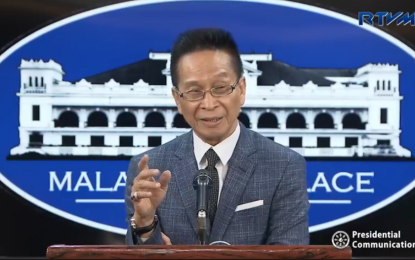
Presidential Spokesman Salvador Panelo
MANILA -- Members of the political opposition always find fault in the language of President Rodrigo Roa Duterte, Malacañang on Thursday said.
This after Vice President Leni Robredo asked Presidential Spokesperson and Chief Presidential Legal Counsel Salvador S. Panelo to talk first with the Chief Executive before issuing official statements from the Palace.
“Firstly, we [President Duterte] talk before I issue statements. Secondly, the problem with them is that they do not listen to official statements issued by this office,” Panelo said in a Palace press briefing.
Panelo clarified that he read first the transcript containing the language used by Duterte when the President conveyed his message on the arbitral ruling to Chinese President Xi Jinping when the two leaders met in Beijing last August 29.
“In fact, that was read again by Mr. (Foreign Affairs Secretary Teodoro) Locsin in the Senate. It’s the same message. They are always finding fault to what the President says. When he makes an official statement, that is the statement,” he added.
He also reiterated that what Duterte meant with ‘setting aside’ the arbitral ruling was that aside from the maritime or territorial dispute, there are other concerns that may first be discussed that would be beneficial to the Philippines and China.
“Now he [Duterte] speaks of setting aside. What he really meant was just lay it aside for a while. As he said repeatedly, there was an agreement to peacefully negotiate, but we have to talk about other concerns that are mutually beneficial to both countries,” Panelo explained.
“They are always finding fault in the language of the President. They are not listening to what he has made officially in his many statements after the [China] visit,” he added.
Last Friday, Panelo said Duterte would never abandon the Permanent Court of Arbitration’s verdict favoring the Philippines’ arbitration case against China’s nine-dash line map which covers nearly the entire South China Sea. (PR)
